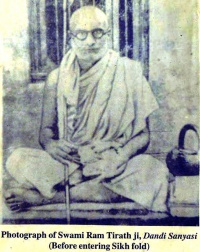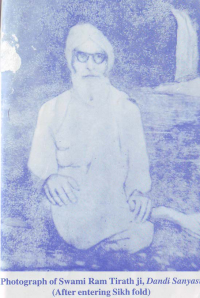Swami Ram Tirath Dandi Sanyasi: Difference between revisions
No edit summary |
|||
| Line 8: | Line 8: | ||
'''Swami Ram Tirath Dandi Sanyasi''' also known as '''Dandi Sannyasi''' (different from Rama Tirtha, Swami), was a recluse who after a prolonged spiritual quest turned to the [[Guru Granth Sahib]]. Born on 31 August 1897 to '''Pundit Balak Ram''' and '''Hari Devi''', a Gaur Brahman family of the village of Tohra, in the then princely state of Nabha, he received the name of Ram Pratap but was rechristened Swami Ram Tirath by Swami Narayan Tirath, an ex-Principal of Queens College at Calcutta, who initiated him into sannyasi order in 1937. | '''Swami Ram Tirath Dandi Sanyasi''' also known as '''Dandi Sannyasi''' (different from Rama Tirtha, Swami), was a recluse who after a prolonged spiritual quest turned to the [[Guru Granth Sahib]]. Born on 31 August 1897 to '''Pundit Balak Ram''' and '''Hari Devi''', a Gaur Brahman family of the village of Tohra, in the then princely state of Nabha, he received the name of Ram Pratap but was rechristened Swami Ram Tirath by Swami Narayan Tirath, an ex-Principal of Queens College at Calcutta, who initiated him into sannyasi order in 1937. | ||
For his early education. Ram Tirath was apprenticed to a Pandit in Nabha from where he moved to Patiala to study Sanskrit grammar with '''Pandit Ram Basant Singh''', his cousin and a famous Nirmala scholar, who later took him to the Nirmala Akhara at [[Nankana Sahib]], the birthplace of [[Guru Nanak]], and taught him the Sikh texts. When he came of age, he joined the Patiala state army (Risala No. 2) and served for three years. | For his early education. Ram Tirath was apprenticed to a Pandit in Nabha from where he moved to Patiala to study Sanskrit grammar with '''[[Pandit Ram Basant Singh]]''', his cousin and a famous Nirmala scholar, who later took him to the Nirmala Akhara at [[Nankana Sahib]], the birthplace of [[Guru Nanak]], and taught him the Sikh texts. When he came of age, he joined the Patiala state army (Risala No. 2) and served for three years. | ||
He then quit the army and travelled extensively, consorting with saints and sadhus. It was during this odyssey that he met Swami Narayan Tirath at [[Haridwar]]. During the following four years he traveled through Haryana, Uttar Pradesh and Rajasthan, and it was during this tour that he met a '''Dandi Sannyasi''' at '''Viat Visvesvar Ashram''' `Aligarh, who taught him Upanisads and Vedant Shastras. | He then quit the army and travelled extensively, consorting with saints and sadhus. It was during this odyssey that he met Swami Narayan Tirath at [[Haridwar]]. During the following four years he traveled through Haryana, Uttar Pradesh and Rajasthan, and it was during this tour that he met a '''Dandi Sannyasi''' at '''Viat Visvesvar Ashram''' `Aligarh, who taught him Upanisads and Vedant Shastras. | ||
Revision as of 22:14, 12 March 2010
Swami Ram Tirath Dandi Sanyasi (31 August 1897 - 12 May 1977) was born in Brahmin family at Tohra village in Patiala, Punjab India. He was a Hindu theologian, Sanskrit scholar and an expert in the Vedas, Puranas and Simrities (ancient Hindu scriptures). In his later years, he became the author of the publications "Supreme Scriptures, Sri Guru Granth Sahib" and "Paramount Religion, Khalsa Panth" (both originally written in Hindi; subsequently translated into Punjabi and English).
Biography
Swami Ram Tirath Dandi Sanyasi also known as Dandi Sannyasi (different from Rama Tirtha, Swami), was a recluse who after a prolonged spiritual quest turned to the Guru Granth Sahib. Born on 31 August 1897 to Pundit Balak Ram and Hari Devi, a Gaur Brahman family of the village of Tohra, in the then princely state of Nabha, he received the name of Ram Pratap but was rechristened Swami Ram Tirath by Swami Narayan Tirath, an ex-Principal of Queens College at Calcutta, who initiated him into sannyasi order in 1937.
For his early education. Ram Tirath was apprenticed to a Pandit in Nabha from where he moved to Patiala to study Sanskrit grammar with Pandit Ram Basant Singh, his cousin and a famous Nirmala scholar, who later took him to the Nirmala Akhara at Nankana Sahib, the birthplace of Guru Nanak, and taught him the Sikh texts. When he came of age, he joined the Patiala state army (Risala No. 2) and served for three years.
He then quit the army and travelled extensively, consorting with saints and sadhus. It was during this odyssey that he met Swami Narayan Tirath at Haridwar. During the following four years he traveled through Haryana, Uttar Pradesh and Rajasthan, and it was during this tour that he met a Dandi Sannyasi at Viat Visvesvar Ashram `Aligarh, who taught him Upanisads and Vedant Shastras.
In 1941, he moved into Sonia Temple, at Ludhiana. Now began the most productive period of his life during which he wrote eighteen books and tracts in Sanskrit, Hindi and Punjabi. In Punjabi were his Sarvotam Granth Adi Sri Guru Granth Sahib ( ਸਰਵੋਤਮ ਗਰੰਥ ਆਦਿ ਸਰੀ ਗਰੂ ਗਰੰਥ ਸਾਹਿਬ ) and Sarvotam Dharam Khalsa Panth ( ਸਰਵੋਤਮ ਧਰਮ ਖਾਲਸਾ ਪੰਥ ) the former on Sikh Scripture declaring it to be the supreme religious text and the latter on the Sikhs, followers of this Scripture whom he describes as the very salt of the earth. Swami Ram Tirath died at Haridvar on 12 May 1977 as Ram Tirath Singh.
Excellence of Sikhism, Sarup S. Alag
Swami Ram Tirath was a very famous scholar on Hindu culture and religion. He once studied the Sikh scriptures and was so inspired that he himself became a Sikh. He wrote a book entitled, "Sarvotam Dharam Granth - Siri Guru Granth Sahib te Sarvotam Dharam - Khalsa Panth", meaning the best scripture is Guru Granth Sahib ji and the best religion is the Khalsa Panth. Later in life he got baptised into the Sikh faith.
Embracing Khalsa lifestyle in later age
" After having studied the scriptures, in many respects I have discarded the Vedas, Shastras, Smiritis, all Sutras, Tantras and Puranas, knowing them to be polluted and corrupted by many impurities. I have found that only the Holy Guru Granth Sahib is completely free of contamination and knowing it to be benevolent for the whole humanity, I have accepted this scripture and I accept myself to be the Sikh of Guru Nanak Dev, therefore I am a Sikh of the Guru."
Notable writings of Swami Ram Tirath
- Supreme Scriptures, Sri Guru Granth Sahib
- Paramount Religion, Khalsa Panth
- सरढ़वोतम गढ़रंथ आदि शढ़री गढ़रढ़ गढ़रनढ़थ साहिब|
- सरढ़वोतम धरढ़म खालसा पंथ|


